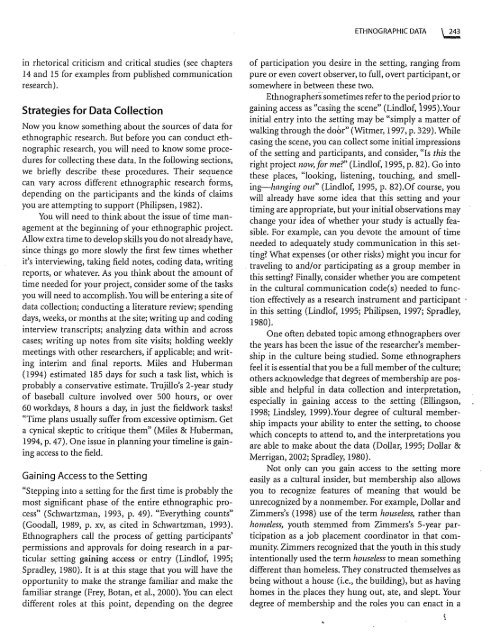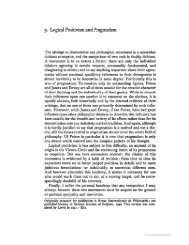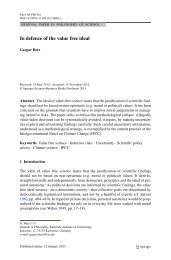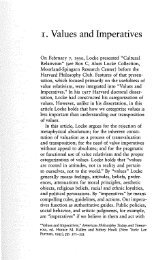Ethnographic Research - Matthew J. Brown
Ethnographic Research - Matthew J. Brown
Ethnographic Research - Matthew J. Brown
- No tags were found...
Create successful ePaper yourself
Turn your PDF publications into a flip-book with our unique Google optimized e-Paper software.
ETHNOGRAPHIC DATA \ 243in rhetorical criticism and critical studies (see chapters14 and 15 for examples from published communicationresearch).Strategies for Data CollectionNow you know something about the sources of data forethnographic research. But before you can conduct ethnographicresearch, you will need to know some proceduresfor collecting these data. In the following sections,we briefly describe these procedures. Their sequencecan vary across different ethnographic research forms,depending on the participants and the kinds of claimsyou are attempting to support (Philipsen, 1982).You will need to think about the issue of time managementat the beginning of your ethnographic project.Allow extra time to develop skills you do not already have,since things go more slowly the first few times whetherit's interviewing, taking field notes, coding data, writingreports, or whatever. As you think about the amount oftime needed for your project, consider some of the tasksyou will need to accomplish. You will be entering a site ofdata collection; conducting a literature review; spendingdays, weeks, or months at the site; writing up and codinginterview transcripts; analyzing data within and acrosscases; writing up notes from site visits; holding weeklymeetings with other researchers, if applicable; and writinginterim and final reports. Miles and Huberman(1994) estimated 185 days for such a task list, which isprobably a conservative estimate. Trujillo's 2-year studyof baseball culture involved over 500 hours, or over60 workdays, 8 hours a day, in just the fieldwork tasks!"Time plans usually suffer from excessive optimism. Geta cynical skeptic to critique them" (Miles & Huberman,1994, p. 47). One issue in planning your timeline is gainingaccess to the field.Gaining Access to the Setting"Stepping into a setting for the first time is probably themost significant phase of the entire ethnographic process"(Schwartzman, 1993, p. 49). "Everything counts"(Goodall, 1989, p. xv, as cited in Schwartzman, 1993).Ethnographers call the process of getting participants'permissions and approvals for doing research in a particularsetting gaining access or entry (Lindlof, 1995;Spradley, 1980). It is at this stage that you will have theopportunity to make the strange familiar and make thefamiliar strange (Frey, Botan, et al., 2000). You can electdifferent roles at this point, depending on the degreeof participation you desire in the setting, ranging frompure or even covert observer, to full, overt participant, orsomewhere in between these two.Ethnographers sometimes refer to the period prior togaining access as "casing the scene" (Lindlof, 1995).Yourinitial entry into the settihg may be "simply a matter ofwalking through the dobr" (Witmer, 1997, p. 329). Whilecasing the scene, you can collect some initial impressionsof the setting and participants, and consider, "Is this theright project now,for me?" (Lindlof, 1995, p. 82). Go intothese places, "looking, listening, touching, and smelling-hangingout" (Lindlof, 1995, p. 82).Of course, youwill already have some idea that this setting and yourtiming are appropriate, but your initial observations maychange your idea of whether your study is actually feasible.For example, can you devote the amount of timeneeded to adequately study communication in this setting?What expenses (or other risks) might you incur fortraveling to and/or participating as a group member inthis setting? Finally, consider whether you are competentin the cultural communication code(s) needed to functioneffectively as a research instrument and participantin this setting (Lindlof, 1995; Philipsen, 1997; Spradley,1980).One often debated topic among ethnographers overthe years has been the issue of the researcher's membershipin the culture being studied. SOIlle ethnographersfeel it is essential that you be a full member of the culture;others acknowledge that degrees of membership are possibleand helpful in data collection and interpretation,especially in gaining access to the setting (Ellingson,1998; Lindsley, 1999).Your degree of cultural membershipimpacts your ability to enter the setting, to choosewhich concepts to attend to, and the interpretations youare able to make about the data (Dollar, 1995; Dollar &Merrigan, 2002; Spradley, 1980).Not only can you gain access to the setting moreeasily as a cultural insider, but membership also allowsyou to recognize features of meaning that would beunrecognized by a nonmember. For example, Dollar andZimmers's (1998) use of the term houseless, rather thanhomeless, youth stemmed from Zimmers's 5-year participationas a job placement coordinator in that community.Zimmers recognized that the youth in this studyintentionally used the term houseless to mean somethingdifferent than homeless. They constructed themselves asbeing without a house (i.e., the building), but as havinghomes in the places they hung out, ate, and slept. Yourdegree of membership and the roles you can enact in a






